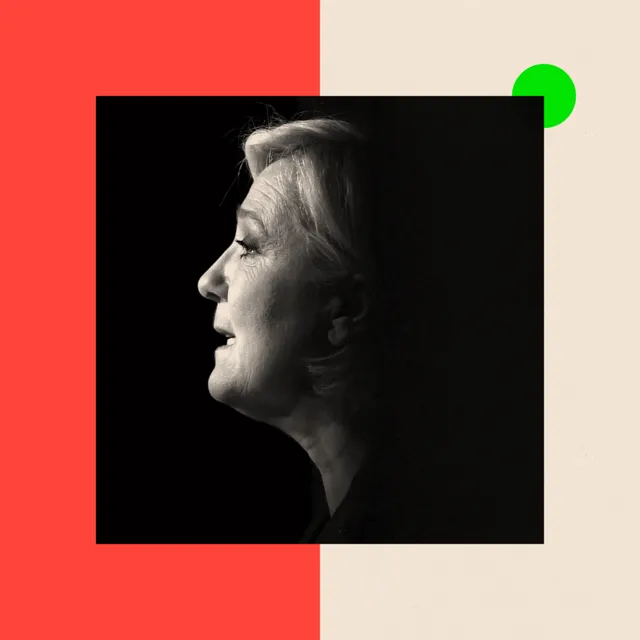
Paris correspondent
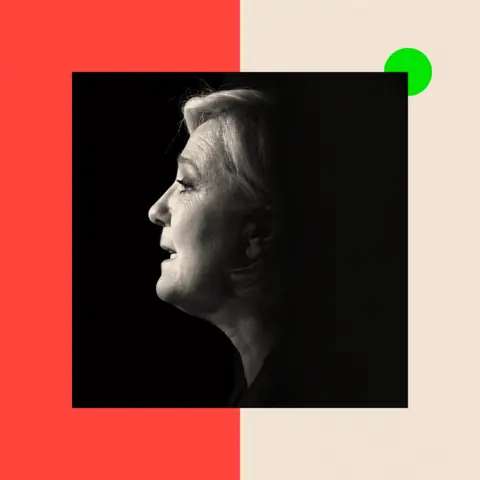 BBC
BBCOutrage is a precious political currency and France’s far right has spent this week attempting, furiously and predictably, to capitalise on the perceived injustice of a court’s decision to block its totemic leader, Marine Le Pen, from standing in the 2027 presidential election.
The airwaves have been throbbing with indignation.
“Be outraged,” said one of Le Pen’s key deputies, on French television, in case anyone was in doubt as to what their reaction should be.
But it remains unclear whether Le Pen’s tough sentence will broaden support for her party, the National Rally (RN), or lead to greater fragmentation of the French far right. Either way, it has created a feverish mood among the nation’s politicians.
Le Pen and her allies have boldly declared that France’s institutions, and democracy itself, have been “executed”, are “dead”, or “violated”. The country’s justice system has been turned into a “political” hit squad, shamelessly intervening in a nation’s right to choose its own leaders. And Marine Le Pen has been widely portrayed, with something close to certainty, as France’s president-in-waiting, as the nation’s most popular politician, cruelly robbed of her near-inevitable procession towards the Élysée Palace.
“The system has released a nuclear bomb, and if it is using such a powerful weapon against us, it is obviously because we are about to win the elections,” Le Pen fumed at a news conference, comparing herself to the poisoned, imprisoned, and now dead Russian opposition politician Alexei Navalny.
As France assesses its latest political tremors, an uneven pushback has begun.
No clear frontrunner for president
Nervous about the impact the judgement may have for the country’s frail coalition government, the Prime Minister François Bayrou has admitted to feeling “troubled” by Le Pen’s sentence and worried about a “shock” to public opinion.
But other centrist politicians have taken a firmer line, stressing the need for a clear gap between the justice system and politics.
 Getty Images
Getty ImagesAn early opinion poll appears to show the French public taking a calm line, bursting – or at least deflating – the RN’s bubble of outrage. The poll, produced within hours of the court’s ruling, showed less than a third of the country – 31% – felt the decision to block Le Pen, immediately, from running for public office, was unjust.
Tellingly, that figure was less than the 37% of French people who recently expressed an interest in voting for her as president.
In other words, plenty of people who like her as a politician also think it reasonable that her crimes should disqualify her from running for office.
And remember, French presidential elections are still two years away – an eternity in the current political climate.
Emmanuel Macron is not entitled to stand for another term and no clear alternative to Le Pen, from the left or centre of French politics, has yet emerged. Le Pen’s share of the vote has consistently risen during her previous three failed bids for the top job but it is premature, at best, to consider her a shoo-in for 2027.
Le Pen’s crime and punishment
Anyone who followed the court case against her and her party colleagues in an impartial fashion would struggle to conclude that the verdicts in Le Pen’s case were unreasonable.
The evidence of a massive and coordinated project to defraud the European Parliament and its associated taxpayers included jaw-droppingly incriminating emails suggesting officials knew exactly what they were doing, and the illegality of their actions.
That the corruption was for the party, not for personal gain, surely changes nothing. Corruption is corruption. Besides, other parties have also been found guilty of similar offences.
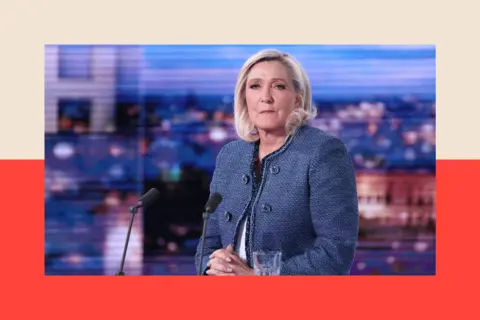 Getty Images
Getty ImagesRegarding the punishments handed out by the court, here it seems fair to argue that Le Pen and her party made a strategic blunder in their approach to the case.
Had they acknowledged the facts, and their errors, and cooperated in facilitating a swift trial rather than helping to drag the process out for almost a decade, the judges – as they’ve now made clear – might have taken their attitude towards the case into consideration when considering punishments.
“Neither during the investigation nor at the trial did [Le Pen] show any awareness of the need for probity as an elected official, nor of the ensuing responsibilities,” wrote the judges in a document explaining, often indignantly, why they’d delivered such a tough sentence.
They berated Le Pen for seeking to delay or avoid justice with “a defence system that disregards the uncovering of the truth”.
Hypocrisy among the elite
It is worth noting, here, the wider hypocrisy demonstrated by elites across France’s political spectrum who have recently been muttering their sympathy for Le Pen. It is nine years since MPs voted to toughen up the laws on corruption, introducing the very sanctions – on immediately banning criminals from public office – that were used by the judges in this case.
That toughening was welcomed by the public as an antidote to a judicial system stymied by an indulgent culture of successive appeals that enabled – and sometimes still enables – politicians to dodge accountability for decades.
Le Pen is now being gleefully taunted by her critics online with the many past instances in which she has called for stricter laws on corruption.
“When are we going to learn the lessons and effectively introduce lifelong ineligibility for those who have been convicted of acts committed while in office or during their term of office?” she asked in 2013.
Reasonable people can reasonably disagree about the court’s sentencing decisions in Le Pen’s case. But the notion – enthusiastically endorsed by populist and hard-right politicians across Europe and the US – that she is a victim of a conspiratorial political plot has clearly not convinced most French people.
At least not yet.
Future of France’s far right
So where does this verdict – clearly a seismic moment in French politics – leave the National Rally and the wider far-right movement?
The short answer is that no one knows. There are so many variables involved – from the fate of Le Pen’s fast-tracked appeal, to the RN’s succession strategy, to the state of France’s precarious finances, to the broader political climate and the see-sawing appetite for populism both within France and globally – that predictions are an even more dubious game than usual.
The most immediate question – given the slow pace of the legal appeal that Le Pen has vowed to initiate – is whether the RN will seek prompt revenge in parliament by attempting to bring down the fragile coalition government of François Bayrou.
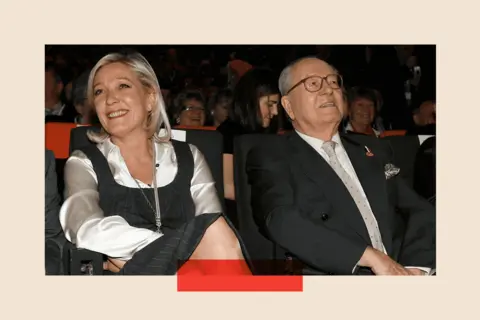 Getty Images
Getty ImagesThat could lead to new parliamentary elections this summer and the possibility that the RN could capitalise on its victim status to increase its lead in parliament and perhaps, even, to push the country towards a deadlock in which President Macron might – yet another “might” – feel obliged to step down.
One person who will now be facing extra scrutiny is Le Pen’s almost but not quite anointed successor, 29-year-old Jordan Bardella, who could be drafted in as a replacement presidential candidate if Le Pen’s own “narrow path” towards the Élysée remains blocked on appeal.
If social-media-savvy Bardella’s popularity among French youth is any indication of his prospects, he could well sweep to victory in 2027. He has found a way to tap into the frustrations of people angry about falling living standards and concerns about immigration.
 Getty Images
Getty ImagesBut turning youthful support into actual votes is not always straightforward, and other, more experienced and mainstream figures on the right may well be sensing an opportunity too.
The Interior Minister, Bruno Retailleau, is widely seen to be emerging as a potential contender. Some even wonder if the provocative television personality, Cyril Hanouna, might become a serious political force on the right of French politics.
Meanwhile, Bardella, like the RN in general, has been on a highly disciplined mission to detoxify the party’s once overtly racist and antisemitic brand. In February, for instance, he abandoned plans to speak at America’s far-right CPAC event after Donald Trump’s former advisor Steve Bannon made a Nazi salute.
But this week’s events have revealed that the RN is enthusiastically committed to the distinctly Trump-ian and populist strategy of blaming its misfortunes on a “swamp” of unelected officials. Bardella, meanwhile, complained about the recent closure of two right-wing media channels alongside his party’s own legal struggles.
“There is an extremely serious drift today that does not reflect the idea we have of French democracy,” he said.
It’s the sort of language that goes down well with the RN’s core constituency, but its broader appeal may be limited in a country that remains, in many ways, deeply attached to its institutions.
To frame it another way, will French voters be more motivated by the belief that Le Pen was unfairly punished, or by concern that the judges involved have since been the victims of death threats and other insults?
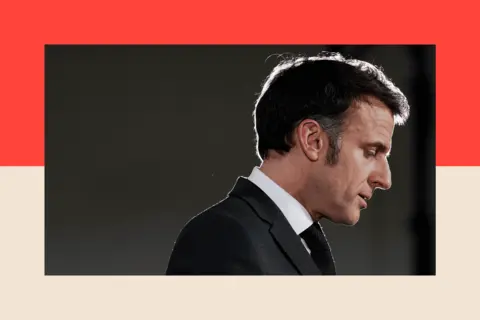 Getty Images
Getty ImagesAs for Marine Le Pen, she has vowed that she will not be sidelined. But her destiny is not entirely in her own hands now. At the age of 56 she has become a familiar figure, fiery at times, but personally approachable, warm and, in political terms, profoundly influential and disciplined. So what next for her?
France has had one Le Pen or other (Marine’s father, Jean-Marie ran four times) on their presidential ballot paper since 1988. Always unsuccessfully.
History may well look back on this week as the moment Marine Le Pen’s fate was sealed, in one of three ways: as France’s first female and first far-right president, swept to power on a tide of outrage. As the four-time loser of a French presidential election, finally denied power by the taint of corruption. Or as someone whose soaring political career was brought to an early and shuddering halt by her own miscalculations over a serious embezzlement scandal.
BBC InDepth is the home on the website and app for the best analysis, with fresh perspectives that challenge assumptions and deep reporting on the biggest issues of the day. And we showcase thought-provoking content from across BBC Sounds and iPlayer too. You can send us your feedback on the InDepth section by clicking on the button below.
